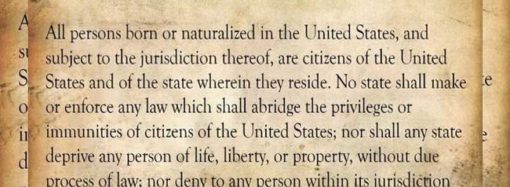The past week saw yet another assault on those reformers who seek to cure federal dysfunction by promoting a “Convention for proposing Amendments.”
The latest attack took the form of an opinion column that in content offered nothing new. It featured many of the usual errors of commission and omission: The author confused a “Convention for proposing Amendments” with a constitutional convention. He alleged that convention protocols are unknown, and that “anything goes” with “no rules, guideposts, or procedures.” He asserted that the courts won’t provide any guidelines and that the convention would threaten “the freedoms we take for granted under the Bill of Rights.” He demonstrated no awareness whatsoever of the history behind the amendment process nor of the long line of judicial decisions, from the Supreme Court and other tribunals, prescribing ground rules for that process.
But this alarmist column was distinctive in two respects. It was not penned by one of the conspiracy types with whom we usually associate such stuff. It was written by Robert Greenstein, a Washington, D.C. insider who served in the Carter and Clinton administrations and on the Obama transition team. Moreover, the medium of publication was the liberal establishment’s iconic newspaper, the Washington Post.
So why are pillars of the liberal establishment picking up the flag from rightwing conspiratorialists?
The answer to this question has three parts:
* They are resorting to a playbook that was, in fact, scripted not by conservatives but by the Left;
* the Left has a great deal to lose if the convention movement goes forward; and
* at least some establishment Leftists have become concerned about reformers’ recent successes.
First, as to the playbook:
For many years after the Founding, no one seems to have confused an amendments convention with a constitutional convention. For decades, everyone seems to have recognized that an amendments convention was a convention of states that—like all previous interstate gatherings—was nothing more than a diplomatic task force of state government representatives (“commissioners”) operating under a prescribed agenda.
At the turn of the last century, however, when state legislatures were applying for a convention to propose direct election of U.S. Senators, a few opponents began to contend that any such gathering would be a “constitutional convention.” During the 1960s and 1970s, the liberal establishment elaborated this contention into the “runaway convention” scenario often advanced today.
Several perceived threats precipitated the Left’s invention of the runaway scenario. The first was an effort by Senator Everett Dirksen (R.-Ill.) for a convention to propose an amendment overruling the Supreme Court’s legislative reapportionment decisions. The second was a movement to adopt a federal balanced budget amendment. The third was talk of a convention to propose an amendment reversing the Supreme Court’s abortion decision in Roe v. Wade.
Russell Caplan’s book Constitutional Brinksmanship (Oxford University Press, 1988) chronicles some of the methods the Left used to respond to those perceive threats. Senators Robert Kennedy (D.-N.Y.) and Joe Tydings (D.-Md.) led opposition in the Senate, and several Kennedy associates, such as Theodore Sorensen and Arthur Goldberg, led a public disinformation campaign. Various liberal academics also participated.
Perhaps the most heated anti-convention rhetoric came from the New Yorker’s Richard Rovere, a Kennedy sycophant. Rovere charged that a convention could “reinstate segregation and even slavery; throw out much or all of the Bill of Rights . . eliminate the Fourteenth Amendment’s due-process clause . . . and perhaps, for good measure, eliminate the Supreme Court itself.” In the 1980s, Chief Justice Warren Burger, apparently concerned for the power of his court, adopted a less heated version of the same line.
From the participants’ viewpoint, the disinformation campaign was an unqualified success: It frightened enough people effectively to disable one of the Constitution’ most important checks and balances. Unfortunately, it was a disaster for the country, because it removed a crucial constitutional curb on federal overreaching.
During next 20 years, figures on the political Left found it unnecessary to do their own heavy lifting because many naive conservatives did it for them by alarming enough people to defeat all efforts to impose restraint, fiscal or otherwise, on Washington, D.C.
A few years ago, however, the tide began to change. Several scholars, I among them, undertook previously-neglected legal and historical research into the amendment procedure. We restored for all to read the rules as the Founders understood them and as the courts apply them. Then Mark Levin publicized these findings in his best-selling book, The Liberty Amendments.
Empowered by this new information, state lawmakers began to resume their constitutional responsibilities in the amendment process. Most state legislatures now participate in the Assembly of State Legislatures, an organization planning for a possible amendments convention. Since 2011, at least 11 states have adopted at least 15 formal applications for a convention. Most of those applications are targeted at federal fiscal excess.
Obviously, reinvigorating of a procedure by which the people, acting through their state legislatures, can check federal overreaching, is not something that people like Mr. Greenstein and other Washington, D.C. power brokers want to see. It poses to them the threat of authority seeping out of Washington and back to the state capitals and to the people at large. Hence their wish to bury the movement as quickly as they can. If scaremongering from the Right won’t do the job, then they’ll try scaremongering from the Left.
Several years ago, I advised reformers that they would know they were winning when the liberal establishment stopped using misguided conservatives as cannon fodder, and entered the fray directly. That has now happened.
I further advised that the power of the Left would pose a far greater challenge than the arguments of conservatives. Reformers have largely overcome the lesser challenge. America’s future depends heavily on whether they can overcome the greater.









